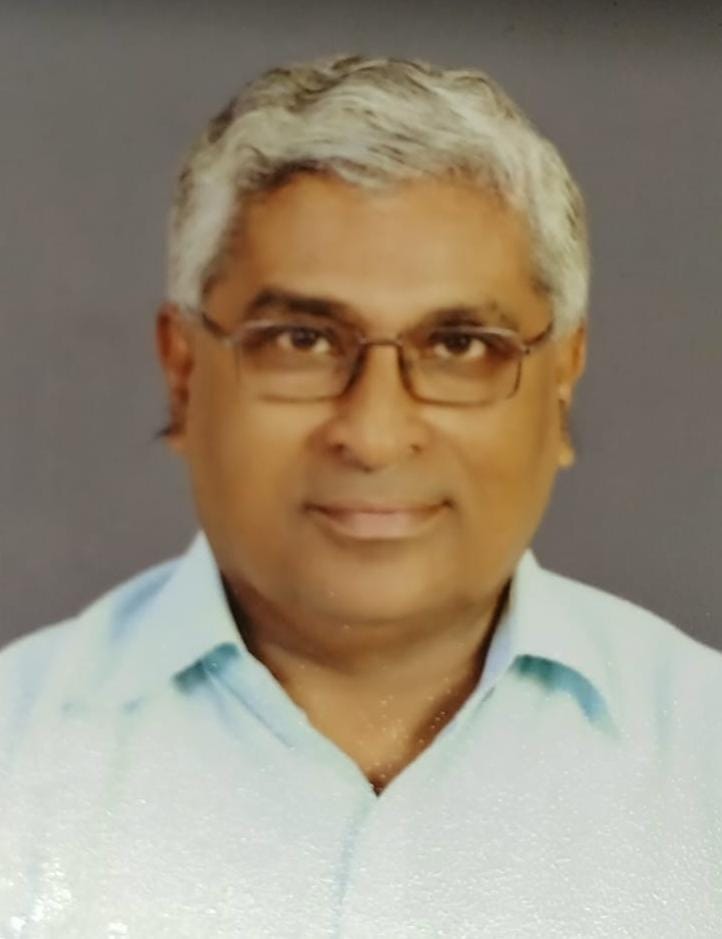
Date of Birth: 9th July 1953.
Position Held Now: CEO Pentoreum Innovations Private Limited, which is
Registered as a Start-Up Venture with Government of India.
Education:
INDIA PATENTS Granted:
Patentee: Prof. Varkey Mathew, Mr. Cheloor Unnikrishnan Nair and Mr. Padmanabhan Sivasankaran
STEPS TAKEN FOR IMPLEMENTING THE INNOVATION
A Company “Pentoreum Innovations Private Limited” has been registered for establishing a Manufacturing Units, along with Laboratory facilities for further Research to make many more products of various applications:
By making use of Water hyacinth, POLY-FIBRILLATED CELLULOSE RESIN is prepared and with this resin Laminated Particle Board, Medium Density Fiber Board, Floor Tiles, Ceiling Boards, etc., are to be MANUFACTURED.
The Company is registered as a Start-Up Venture, by Government of India Scheme.
Professional Experience:
Co-curricular Activities & Research Projects:
Award Received: Air India – Manorama BEST ‘TEACHER – LEARNER’ Award for Kottayam District, 2006.
Social / Political Activities
Conducting Yoga Training Classes I Yoga Therapy to Men, Women and Children, from 1990 onwards;
Holding Classes on Energy and Environmental Conservation and Waste Management to various groups like Farmers, Students, Housewives, Resident Welfare Associations, Kudumbasree Unit Members, for the last 20 years;
About Family:
Wife: Ms. ReebaVarkey B.Sc., M.A., B.Ed., Former Member, Kerala State Social Welfare Board [Nominated by the National Social Welfare Board]; Former Chairperson, Kottayam Municipal Council (October 2005 – July 2009)
Daughter: Ms. Anju Sara Sabin,M.SW., M.Phil; Senior Social Welfare Officer, Melboum, Australa.
Son: Er. Appu Mathew Varkey, M.Tech; Principal Engineer, Global Foundries, Singapore
PROFILE OF STARTUP
PENTOREUM INNOVATIONS PRIVATE LIMITED
CIN: U73200KL2017PTC049712, Date of Incorporation: 11th July 2017
CEO: Prof. Varkey Mathew [DIN: 07857144]
Director: Mr. Alexander Samuel Thomas MBA [DIN: 0312609]
Objectives:
To conduct Research and studies to manufacture Environment-friendly products using waste materials (Biomass) or invasive weeds, like Water hyacinth etc.;
To design and develop machinery for establishing manufacturing units for the production of such value added materials;
To make use of wastes/weeds that would be generating green house gases like methane, carbon dioxide hydrogen sulfide, etc,;
To do innovative studies to develop new technologies to FIX carbon so that environmental pollution is avoided; and
To establish such manufacturing units in Developing countries, that are mainly in the Tropical region, where the raw materials are available in larger quantities, so that the local people get better and more job opportunities, from collection and transportation of raw materials, processing, etc., to final delivery to distant destinations.
Innovative Technologies/Processes that can be made use of in the Proposed Manufacturing units
“Particle Board made of Cellulose nanofibre prepared from Water hyacinth”.
The main innovation is the Process for preparing ‘Fibrillated cellulose’ from the weed, which provides a RESIN that can be used for manufacturing particle board, MDF, etc. The Resin thus generated is FREE of formaldehyde which is a CARCINOGEN that is part of the existing Urea-formaldehyde and Phenol formaldehyde resins in use (almost in 90% of boards, etc.); the Resin, “Poly-fibrillated cellulose” contains ONLY CELLULOSE, AND ANY PRODUCT WILL NOT GENERATE CARCINOGENIC OR OTHERWISE HARMFUL GASES.
b) India Patent No. 244800; Patentee: Prof. Varkey Mathew et. al.
“Process for manufacturing Polymeric material of Cellulose nanofibre from wastes of Plantain and Banana plants”.
This innovation can be applied for the manufacture of many medically important products, like bandage, prosthetics, helmets, etc., making use of the farm wastes of banana, plantain, etc.
Preference for Water hyacinth weed harvesting and processing
The need for using Water hyacinth for manufacturing “Poly-fibrillated cellulose” Resin and thereby to manufacture particle board, etc. [Patent No. 314150]
Tens of thousands of hectares of water bodies in the Tropical and subtropical countries are suffering from the “Water hyacinth Carpets”. As a consequence of the thick covering, fishing, water transport for goods and people, tourism, etc., are heavily hindered and as a result millions are thrown into utter poverty worldwide. Application of this Patented Technology can become highly relieving to the hardships of the people in all these countries.
The Benefits
The weed plants as a whole (including leaves, roots and stem) can be collected, thereby eliminating pollution to a good extent;
Large bulks (hundreds of tons per day) can be collected using ‘Harvesters’ and processed to generate the Resin;
Manufacturing units can be installed in locations where there is a large quantity available, like, few hundred hectares filled with carpets (usually 300 to 500 tons of weed would be present in one hectare); and
The Resin can be used for manufacturing products of different Composites, as done with formaldehyde resins, as well as other forms like tiles, boards, etc.
© 2024 Media Toons- All Rights Reserved.